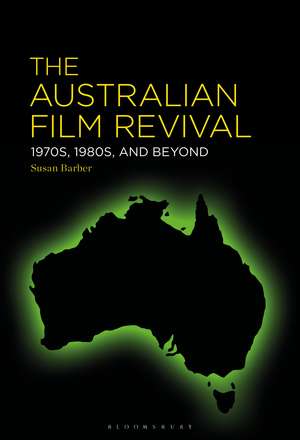The Australian Film Revival: 1970s, 1980s, and Beyond
Autor Susan Barberen Limba Engleză Hardback – 8 feb 2023
| Toate formatele și edițiile | Preț | Express |
|---|---|---|
| Paperback (1) | 192.01 lei 3-5 săpt. | |
| Bloomsbury Publishing – 21 aug 2024 | 192.01 lei 3-5 săpt. | |
| Hardback (1) | 540.31 lei 6-8 săpt. | |
| Bloomsbury Publishing – 8 feb 2023 | 540.31 lei 6-8 săpt. |
Preț: 540.31 lei
Preț vechi: 773.98 lei
-30% Nou
Puncte Express: 810
Preț estimativ în valută:
103.39€ • 108.31$ • 85.69£
103.39€ • 108.31$ • 85.69£
Carte tipărită la comandă
Livrare economică 08-22 aprilie
Preluare comenzi: 021 569.72.76
Specificații
ISBN-13: 9781501390029
ISBN-10: 1501390023
Pagini: 280
Dimensiuni: 152 x 229 x 22 mm
Greutate: 0.54 kg
Editura: Bloomsbury Publishing
Colecția Bloomsbury Academic
Locul publicării:New York, United States
ISBN-10: 1501390023
Pagini: 280
Dimensiuni: 152 x 229 x 22 mm
Greutate: 0.54 kg
Editura: Bloomsbury Publishing
Colecția Bloomsbury Academic
Locul publicării:New York, United States
Caracteristici
Discusses a range of groundbreaking films (including Walkabout and Rabbit Proof Fence) which span over three decades, giving insight into Aboriginal culture and history, frequently with respect to the ubiquity of the white settler society
Notă biografică
Susan Barber is an Emeritus Professor in the Film, Television, and Media Studies Department in the School of Film and Television, Loyola Marymount University, USA, and has taught film history at LMU for over 30 years. She also taught at the University of Southern California and the University of California, Irvine, USA. She received her Masters and Doctorate degrees from the School of Cinematic Arts, University of Southern California, USA.
Cuprins
AcknowledgementsDedicationIn Memory OfIntroduction1. The Ocker: Chauvinistic and Oedipal2. Alternate Masculinities of Paul Cox and John Duigan3. Historical Women and the Bush4. Negligent, Runaway, and Abject Mothers5. The Indigenous Road Film6. Australian GothicIndex
Recenzii
Australian film narratives of sacrifice, survival, colonial violence, toxic masculinity, abject mothers, and more are explored through the critical and analytical lens of a film studies expert with a wealth of experience in teaching Australian cinema. Barber's investigation is timely and important, and grounded in an astounding amount of scholarship.
